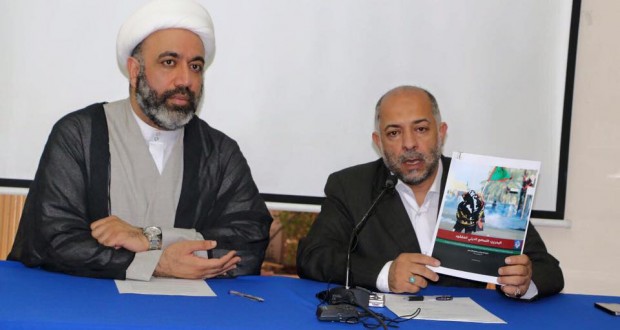Bahrain is to see annual procession marches this week as Muslims Shiites commemorate 40 days on the martyrdom of Imam Husain, the grandson of Prophet Muhammad (pbuth). In this context, activists are shedding light on the violations of religious freedom perpetrated by the Bahraini Authorities last October in the days of Ashura, where the country sees wide manifestations, open lectures and processions in remembrance of Imam Husain ibn Ali (pbuth).
The U.S. Commission on International Religious Freedom concluded in its annual report that Shiites make 60 to 65 percent of the religious demography in Bahrain, Sheikh Maytham Alsalman said at a joint press conference on religious freedom. “This means restricting and depriving Shiites of the freedom to manifest their religious beliefs in Ashura represents a violation against 60 to 65 percent of the people of Bahrain”.
Alsaman challenged the Bahraini Authorities’ claims of tolerance, “The calls of tolerance cannot be considered honest if they only include some of the respected religious and ethnic factions in Bahrain without the popular majority”.
He outlined that according the Declaration of Principles on Tolerance, 1995, adopted by the General Conference of the UNESCO in its 28th session, “the Authorities in Bahrain are intolerant as the Declaration states in Article 2: Intolerance may take the form of marginalization of vulnerable groups and their exclusion from social and political participation, as well as violence and discrimination against them. This is exactly what a majority of no less than 60 percent in Bahrain is experiencing and complaining of”, adding, “that the millions spent on painting a tolerant image of the government will not do the job as long as persecution continues on ground”.
“Tolerance comes through the adoption of legislations and laws that foster equal citizenship and address the problem of inequality that has persisted for years”, Alsalman stated. “The Authorities are demanded to take measures to prevent the marginalization of Shiite citizens, and the deprivation of their exercise of freedom of expression in political and social issues. And the manifestation of their religious beliefs and rituals without having to be subjected to restriction”.
His statements came to highlight the crackdown on religious manifestations during the events of Ashura in 2015.
Hadi Almusawi, head of Liberties and Human Rights Department in Al Wefaq National Islamic Society, speaking at the conference, pointed out that human rights reports issued by national and international organizations have all confirmed a rise in violations of rights in the occasion of Ashura this year. He said during the Ashura events:
- 63 people were summoned for their participation in the events. Some said they were subjected to mistreatment.
- Religious manifestations in 24 areas were vandalized by security forces.
- 40 people were injured.
In the press conference, Almusawi released his department’s report detailing the forms of violations that took place during the events that coincided October of 2015.

“There must be an adoption of a national plan to stop the violations against the Shiite sect which started with the demolishing of 38 officially registered Shiite mosques”, Alsalman stated.
Dr. Maytham Alsalman listed a number of recommendations included in the report:
- The United Nations must help Bahrain to lay a practical plan and legislate laws to halt persecution of Shiite citizens, by sending a UN group to Bahrain as it does with other countries suffering from racism, discrimination and persecution of national, ethnic or religious factions.
- To schedule a visit for Mr. Heiner Bielefeldt, the Special Rapporteur on freedom of religion or belief, to set an inquiry in the reasons behind religious persecution and advise for the Bahraini government to address the rampant persecution of Shiite citizens.
- To schedule a visit for, Mr. Maina Kiai, Special Rapporteur on the rights to freedom of peaceful assembly and of association to help the government address its violations of the right to peaceful assembly for religious purposes, a rights that is ensured by Article 18 of the on the International Covenant on Civil and Political Rights. Bahrain also needs help to tackle the ban on peaceful political and social assemblies for one year now, most recently it banned an assembly which was organized against the terror attacks in Paris.

/149

